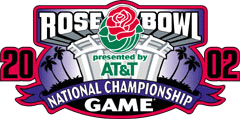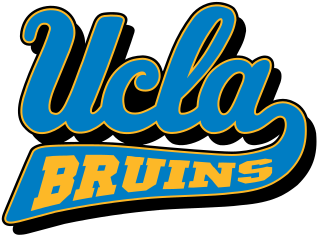Related Research Articles

The Bowl Championship Series (BCS) was a selection system that created four or five bowl game match-ups involving eight or ten of the top ranked teams in the NCAA Division I Football Bowl Subdivision (FBS) of American college football, including an opportunity for the top two teams to compete in the BCS National Championship Game. The system was in place for the 1998 through 2013 seasons and in 2014 was replaced by the College Football Playoff.

Cade Brem McNown is an American former football quarterback who played in the National Football League (NFL) for four seasons. He played college football for the UCLA Bruins, winning the Johnny Unitas Award as a senior. McNown was selected by the Chicago Bears in the first round of the 1999 NFL Draft with the 12th overall pick. However, his Bears tenure would only last two seasons due to injuries and inconsistent play. McNown spent his final two seasons as a backup for the Miami Dolphins and San Francisco 49ers. He was inducted to the College Football Hall of Fame in 2020.
The 1991 NCAA Division I-A football season was the main college football season sanctioned by the National Collegiate Athletic Association (NCAA). The season began on August 28, 1991, and ended on January 1, 1992. For the second consecutive season, there was a split national championship. Both the Miami Hurricanes and the Washington Huskies finished the season undefeated (12–0) and with the top ranking in a nationally recognized poll.
The 1998 NCAA Division I-A football season, play of college football in the United States organized by the National Collegiate Athletic Association at the Division I-A level, began in late summer 1998 and culminated with the major bowl games in early January 1999. It was the first season of the Bowl Championship Series (BCS), which saw the Tennessee Volunteers win the national championship, one year after star quarterback Peyton Manning left for the National Football League (NFL). Tennessee defeated the Florida State Seminoles, 23–16, in the Fiesta Bowl in Tempe, Arizona, to secure the inaugural BCS National Championship.

The 2000 NCAA Division I-A football season ended with the Oklahoma Sooners beating the defending national champion Florida State Seminoles to claim the Sooners' seventh national championship and their thirty-seventh conference championship, the first of each since the 1988 departure of head coach Barry Switzer.

The 2001 NCAA Division I-A football season was the first college football season of the 21st century. It ended with the University of Miami winning the national title for the fifth time.

The 2002 NCAA Division I-A football season ended with a double overtime national championship game. Ohio State and Miami both came into the Fiesta Bowl undefeated. The underdog Buckeyes defeated the defending-champion Hurricanes 31–24, ending Miami's 34-game winning streak. Jim Tressel won the national championship in only his second year as head coach.
The 1988 NCAA Division I-A football season ended with Notre Dame winning the national championship. The Fighting Irish won the title via a 34–21 defeat of previously unbeaten West Virginia in the Fiesta Bowl in Tempe, Arizona. With 4 of the final Top 5 teams being independents, 1988 became a focus for fans and critics who wondered how the traditional conferences would deal with the indies.

The UCLA Bruins football program represents the University of California, Los Angeles, in college football as members of the Big Ten Conference at the NCAA Division I Football Bowl Subdivision (FBS) level. The Bruins play their home games off campus at the Rose Bowl in Pasadena, California.

The UCLA–USC rivalry is the American collegiate athletics rivalry between the UCLA Bruins sports teams of the University of California, Los Angeles (UCLA) and USC Trojans teams of the University of Southern California (USC).

The 2002 Rose Bowl, played on January 3, 2002, was a college football bowl game. It was the 88th Rose Bowl game and was the BCS National Championship Game of the 2001 college football season. The game featured the Miami Hurricanes and the Nebraska Cornhuskers, marking the first time since the 1919 Rose Bowl, and only the third time in the game's history, that neither the Big Ten nor the Pac-10 Conferences had a representative in this game. The Hurricanes won the game, 37–14, for their fifth national title. Miami quarterback Ken Dorsey and wide receiver Andre Johnson were named the Rose Bowl Players of the Game.
The 1967 UCLA vs. USC football game was an American college football game played during the 1967 NCAA University Division football season on November 18, 1967. The UCLA Bruins, 7–0–1 and ranked No. 1, with senior quarterback Gary Beban as a Heisman Trophy candidate, played the USC Trojans, 8–1 and ranked No. 4, with junior running back O. J. Simpson also as a Heisman candidate. This game is widely regarded as the signature game in the UCLA–USC rivalry as well as one of the 20th-century Games of the Century. The 64-yard run by Simpson for the winning touchdown is regarded as one of the greatest run plays in college football.

The 2007 UCLA Bruins football team represented the University of California, Los Angeles (UCLA) in the 2007 NCAA Division I FBS football season. They played their home games at the Rose Bowl in Pasadena, California and were coached by Karl Dorrell for the regular season. It was Dorrell's fifth, and final season as the UCLA head coach. UCLA's season was marked by numerous injuries, particularly at quarterback. Original starting quarterback Ben Olson injured his knee early in the season and missed over four games. Backup quarterback Patrick Cowan also suffered a knee injury but returned for two more games before suffering a collapsed lung against Arizona. Coach Karl Dorrell was fired following the loss in the 77th UCLA–USC rivalry football game, the final regular season game for the Bruins. Defensive coordinator DeWayne Walker became the interim coach for the 2007 Las Vegas Bowl, in which the Bruins lost to BYU, 17–16. The Bruins finished 6–7 overall, 5–4 in the Pacific-10 Conference, where they were tied for fourth place.
The 1999 Rose Bowl was the 85th Rose Bowl game and was played on Friday January 1, 1999, at the Rose Bowl Stadium in Pasadena, California. It was a college football bowl game at the end of the 1998 NCAA Division I-A football season. Wisconsin defeated UCLA by a score of 38–31. Ron Dayne of Wisconsin was named the Rose Bowl Player of the Game. He tied a modern Rose Bowl record with four touchdowns. This was the first year that the Rose Bowl became part of the Bowl Championship Series, ending a long-standing agreement between the Big Ten and the "West Representative" (PCC/AAWU) and the first year that the game was branded with corporate sponsorship. Unlike the other bowl games, the sponsor was not added to the title of the game, but instead as a presenter, so it became known as The Rose Bowl Game presented by AT&T.
The 2003 FedEx Orange Bowl was the 69th edition of the college football bowl game, played at Pro Player Stadium in Miami Gardens, Florida, on Thursday, January 2. It matched the third-ranked Iowa Hawkeyes of the Big Ten Conference and the USC Trojans of the Pacific-10 Conference. Tied at halftime, favored USC pulled away in the second half to win, 38–17.
The 2001 Sugar Bowl was a 2000–01 BCS game played on January 2, 2001. This 67th edition to the Sugar Bowl featured the Florida Gators, and the Miami Hurricanes, in an in-state rivalry game. Miami came into the game ranked 3rd in the BCS, 2nd in both the Coaches and AP Poll, at 10–1, whereas Florida came into the game ranked 7th in the BCS at 10–2. Sponsored by Nokia, the game was officially known as the Nokia Sugar Bowl.
The Bowl Championship Series (BCS) was a selection system used between 1998 and 2013 that was designed, through polls and computer statistics, to determine a No. 1 and No. 2 ranked team in the NCAA Division I Football Bowl Subdivision (FBS). After the final polls, the two top teams were chosen to play in the BCS National Championship Game which determined the BCS national champion team, but not the champion team for independent voting systems. This format was intended to be "bowl-centered" rather than a traditional playoff system, since numerous FBS Conferences had expressed their unwillingness to participate in a play-off system. However, due to the unique and often esoteric nature of the BCS format, there had been controversy as to which two teams should play for the national championship and which teams should play in the four other BCS bowl games. In this selection process, the BCS was often criticized for conference favoritism, its inequality of access for teams in non-Automatic Qualifying (non-AQ) Conferences, and perceived monopolistic, "profit-centered" motives. In terms of this last concern, Congress explored the possibility on more than one occasion of holding hearings to determine the legality of the BCS under the terms of the Sherman Anti-Trust Act, and the United States Justice Department also periodically announced interest in investigating the BCS for similar reasons.
The 1985 Fiesta Bowl was the fourteenth edition of the college football bowl game, played at Sun Devil Stadium in Tempe, Arizona, on Tuesday, January 1. Part of the 1984–85 bowl game season, it matched the fourteenth-ranked UCLA Bruins of the Pacific-10 Conference, and the #13 Miami Hurricanes, an independent.
The 1989 Mobil Cotton Bowl Classic was a college football bowl game played on January 2, 1989, at the Cotton Bowl in Dallas. The game was played on January 2, the day after New Year's Day, since New Year's Day fell on a Sunday. The bowl game featured the Arkansas Razorbacks from the Southwest Conference and the UCLA Bruins from the Pacific-10 Conference and was televised in the United States on CBS. UCLA defeated Arkansas 17-3 for its first Cotton Bowl win. Troy Aikman, the UCLA quarterback and LaSalle Harper, an Arkansas linebacker were named the Most Valuable Players of the game.

The 1998 Arizona Wildcats football team represented the University of Arizona during the 1998 NCAA Division I-A football season. Led by head coach Dick Tomey in his twelfth season, the Wildcats captured a 12–1 record during the year. It was Arizona's first 11-or-more-win season in school history and the best record to date, which surpassed the 1993 team’s record of ten wins. A loss to UCLA in the middle of the regular season prevented the Wildcats from earning an outright Pac-10 title and a potential spot in the Rose Bowl. The team appeared in the Holiday Bowl, and defeating Nebraska to complete the season.
References
- ↑ Crowe, Jerry (September 25, 1998). "UCLA Game Canceled, by Georges". Los Angeles Times. Retrieved February 8, 2022.
- ↑ Reid, Scott (December 4, 2008). "1998: UCLA's sweet season that went sour". Orange County Register. Retrieved February 8, 2022.
- ↑ Ubben, David (November 28, 2018). "'The greatest day in college football history,' told through the eyes of those who lived it". The Athletic. Retrieved February 8, 2022.
- ↑ Sportsline, CBS (December 5, 1998). "Miami upsets No. 3 UCLA". CBS News. Retrieved February 8, 2022.
- ↑ Smith, Craig T. (May 30, 2014). "Flashback Friday: 12/5/98 - Miami 49, #3 UCLA 45". State of the U. Retrieved February 8, 2022.